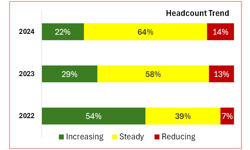A common frustration that I have come across at many of my clients is that they have been unable to forge worthwhile supplier relationships. There is frequent disappointment that, all too often, supplier review meetings become adversarial. Production teams are forced to react to problems that have grown to become major issues. Often such problems have developed to the point where there is substandard product or late delivery, which can be extremely costly to a publisher’s profit margins and reputation. Equally, clients of mine have been concerned that they are expending considerable expensive time and resource in constant fire fighting rather than working with suppliers to improve processes and reduce costs and overhead.
Company culture
It is important to realise that there is no quick fix to this state of affairs. In my experience, suppliers are often wary of a new management process and may regard this as a new way by a client to give their suppliers a hard time! Successful supplier management requires careful management of internal culture as well as effort to work with suppliers to ensure that everybody understands the aims of the new processes and has belief in this change of culture. Everybody must be prepared to buy into a new state of affairs and commit time and energy in building a better relationship. Frequently, a lack of time in explaining the aims of a supplier management programme leads to a cynicism in the process, a lack of true belief and commitment and the ultimate failure of such policies, despite initial good intentions.
A most important part of this culture must be a willingness for you and your staff to record and measure. Any issues of non-compliance must be recorded; otherwise they will be forgotten before the supplier review. The bare statistics of KPIs will not stand up well in supplier review meetings unless they are backed up by facts and proof that have been verified. It is important to ensure that the correct infrastructure is in place for recording. This can be as simple as having a document on a central server for each supplier that is accessible by all production staff. Such a system allows all staff to comment on a supplier in company privacy. Alternatively, a company may wish to adopt a policy of openness and consider a password protected server based discussion document, or even a private blog that is only accessible to relevant parties. This allows suppliers to see company issues and respond in real time. Obviously, such a system requires staff to be restrained in their comments! It is also useful to encourage staff to post nice things about suppliers too as this can present a more balanced view of the actual state of the relationship. However, this can sometimes be an uphill battle!
The actual process of recording should not take too much time. In most cases, the pasting of an email should be sufficient. However, this will all need to be considered when applying any change to your company culture – staff need to understand why they are being asked to undertake this task and what the benefits to them and their company will be.
Procurement policy
One key issue that may have to be considered is the actual procurement strategy at a publisher. Short term relationships are difficult to build into productive relationships. Here is a typical relationship development over a twelve month contract:
* months 1-4: implementation and dealing with teething issues
* months 5-7: (hopefully!) a period of running business smoothly between the two parties. However, there is a lack of desire by either party to invest too much in the relationship because everyone is aware that a new tender process will soon be started...
* months 8-12: concern from supplier at forthcoming tender process, tender process and either signing of new contract or implementing exit strategy
It is therefore preferable to consider relationships of at least 24 months if a meaningful supplier management programme is desired. This gives time for both supplier and client to devote time to true process improvement without the threat of impending supplier change hanging over proceedings.
The final essential element in planning a supplier review process is to understand what you wish to get out of it. There is no point in wasting time in measuring suppliers if there is not a worthwhile benefit resulting from the process. I have encountered some companies that believe that supplier management must be carried out in order to be seen to be committing to a full procurement process. However, if this is purely paying lip service to a process then, in my view, there is no point in commencing the supplier management journey.
Supplier reviews should not take up masses of time or resources unless:
* there are major supply issues
* process reviews are justified in cost savings
Instead your focus needs to be either on
* day to day operations
* reviewing and improving procurement issues in that sector
* moving on to entirely different projects!
Measure you, measure me
The most successful supplier management programmes that I have seen are two way programmes. In these instances, as well as clients measuring suppliers, suppliers are also invited to measure the client and to comment upon their performance. This may seem like a brave thing to do! However, such a policy can then truly be seen to be beneficial to both sides, and an objective review of all processes can be undertaken. It also allows the results of measurement to be put into their proper context. For example, if a supplier is delivering late, is this a result of poor supplier performance or is it actually down to the client failing to deliver instructions, orders or materials in a timely fashion?
Select your KPIs
In order to achieve this two way relationship, a careful choice of KPIs needs to be made. Many KPIs are based on subjective opinion, with staff being asked to score suppliers (or certain aspects of their performance). Such scores can be compromised as they may be highly influenced by the scorer’s latest experience of a supplier or by the state of personal relationships with the supplier (ie. an account manager who does not have a good personal relationship with the production staff may earn their company a poor score no matter how good the service they provide). It is therefore better to focus on measurable facts that cannot be disputed and cannot be influenced by personal opinion. An example of this might be the number of on-time deliveries. However, the correct KPIs should also be measured at the client in order to ensure that scores are made in context. So to have a true picture of on-time delivery from the supplier, one would also need to score on-time supply of materials and order information from the client. Again, KPI measurement and analysis should not be a lengthy and time consuming process. With the right templates in place, it should be easy for one person to manage all the data from 15-20 suppliers in no more than half a day.
KPI data needs to be used effectively. There is no point in measurement for the sake of it. The results can be very useful internally in an organisation to publicise what a department has achieved in improvement of results or process. They can also be used to counter unfair criticism of suppliers. Suppliers can also use this data in worthwhile ways: not only can it help verify or challenge their own internal performance data, but it can also emphasise to all levels of staff how importantly you as the client regard the supplier and it can also be used to foster healthy competition between suppliers! However, the most important use of such data will be during the supplier review process.
Table by the window, please
Supplier reviews can often be seen as meetings of good intent where little is achieved. They can even be seen as little more than suppliers being made to take clients to lunch! It is important to make a review worthwhile and productive, and to ensure the right boundaries are set. A supplier review should be:
* a formal way of ensuring the continuity of the relationship and the review process
* an opportunity to meet key account staff in a less operational atmosphere
* an opportunity to discuss issues in a constructive atmosphere
* a way of ensuring that you are aware of supplier developments
* a way of ensuring that your supplier is up to date with developments at your company
* a chance to discuss KPIs and performance against them
* a way of ensuring opportunities for process improvement and cost reduction are discussed
* a vehicle to ensure that projects are progressed
It is important that supplier reviews avoid being one-sided or seen as a supplier bashing exercise. Equally, day to day operational fire fighting should be outside of the review process, as should formal supply negotiations (although contract changes may sometimes be discussed, and, in poor circumstances, termination clauses referred to). Also, operational staff bonding exercises should be kept separate from the review process. All of these issues have their place – but not at the review!
I would suggest that:
* there is a formal agenda
* the review is chaired by someone from your company
* minutes are taken and circulated
* that there are timelined action points with responsibility assigned to individuals
* that the chair follows the minutes up
* the minutes are updated with results of action points. For this reason, it may be appropriate to host minutes on a server to which the supplier has access so they can add their action points themselves
* that action points are reviewed at the next meeting
Once a supplier management programme has settled down and has been running for a few months, many companies are surprised at the positive results that arise from their new strategy. A good supplier management strategy should bring three key gains:
1. Your suppliers should show an improvement in performance and take non-compliance more seriously
2. Your suppliers should demonstrate commitment to a worthwhile relationship
3. There should be a focus on process improvement and costs should reduce as a result of this
Good luck with your supplier management strategy!










